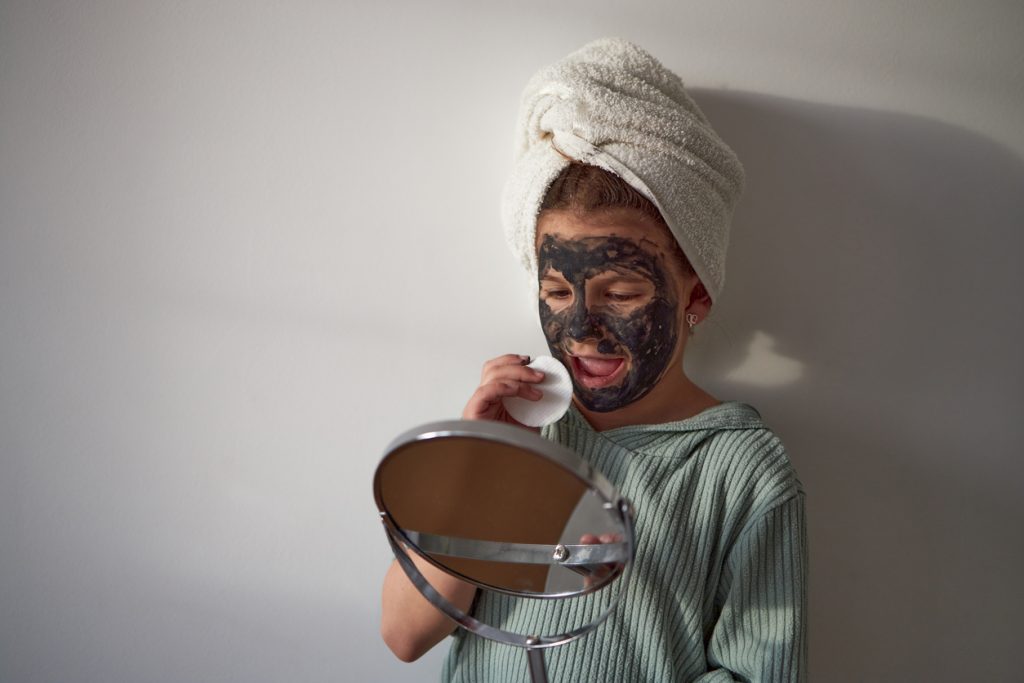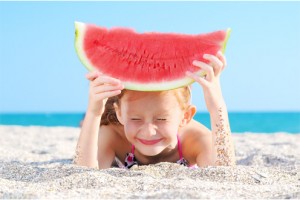Are Your Children Asking For Adult Skincare Products?

Thanks to social media, the use of skincare routines among tweens and teens has been quickly trending upward. As social media influencers of all ages promote skin care, there have been plenty of positive effects on tweens and teens’ skin, but there is also need for concern. Pastel pink and bright blue packaging that promises perfect skin might entice younger skincare fanatics, but this latest craze for pretty products poses a big problem when kids are involved.
Once applied, the active ingredients contained in those beautifully packaged creams and serums might actually do more harm than good. In fact, beginning a multi-step skincare routine too young can disrupt the natural process of the skin cycle and cause premature damage.
It shouldn’t come as a surprise that skincare companies are successfully using social media messaging and marketing to attract more young consumers. In fact, experts say North American teens spent 33% more on cosmetics and 19% more on skincare products in 2023 than the year prior, and that number is expected to grow rapidly. Data from Statista shows that the baby and child skincare market is expected to experience an annual growth rate of about 7.71%, and by 2028 revenue is projected to reach US500 million in market volume worldwide. Meanwhile, the number of product users is expected to reach 160.7 million worldwide by the same year.
This isn’t just about young kids trying the products in their mom’s makeup bag, but an industry expanding to reach a broader age spread of consumers. Several cosmetics and skincare brands have been created in recent years specifically to jump on this trend to serve not only tweens, but even younger demographics. Parents of toddlers may have heard of Yawn, a company that offers makeup and skincare products for ages three and up, while Gryt, which launched in 2023, says its products are for tweens and teens but can be used by those as young as eight years old. Encouraging better skin care at any age isn’t concerning, but experts are slowly starting to speak out specifically on the tween skincare craze that is continuing to explode across TikTok.
They’re warning parents that children and teens should be especially cautious of harsh products like high-chemical acids, exfoliants, and retinol – unless prescribed by a medical professional. These ingredients may be part of an adult’s skincare regimen, but for beauty-obsessed pre-adolescents, they can erode the skin barrier and cause a long list of unwanted reactions and skin problems that could stick around for years, including irritation, inflammation, scarring, burns, congestion, breakouts, and even eczema or dermatitis. Kids may also develop allergies to these substances when exposed to them too early.
“The skin barrier when you’re nine years old is not a fully formed skin barrier. It’s not meant to handle those kinds of ingredients,” according to dermatologist Dr. Jessica Weiser. “Collagen and elastin are robust in [kids’ skin], so they don’t need those things.”
The rise of “Sephora kids”
Videos of young girls crowding Sephora aisles across the country with baskets carrying hundreds of dollars’ worth of products have dominated TikTok for the last several weeks. “My whole FYP [for you page] is about 10 year olds at Sephora. So here’s my four year old shopping at Sephora,” writes one mom in a video she posted on TikTok that shows her daughter happily wandering around the store.
Social media has, of course, changed the entire beauty industry in recent years as cosmetics and skincare manufacturers enjoy a surge of fresh interest from tweens and teens. The issue has been divisive online. The hashtag #teenageskincare has garnered more than 26.4 million views on TikTok, fuelled by junior beauty influencers, some as young as nine — also known as “Sephora kids” — sharing their extensive skincare routines. The hashtag #sephorakids has 331.9 million views on TikTok. “Sephora kids” seem to extensively shop at the beauty retailer, sometimes posting videos of their hauls and skincare routines online, much like the older influencers they may follow.
Unlike generations past, today’s preteens are bombarded with influencer-sponsored advertisements and step-by-step tutorials for makeup and skincare products, and age-appropriate resources are scarce for young girls who don’t want to be treated like kids yet have barely entered adolescence. Young viewers are often finding out about trendy skincare products on social media when an influencer raves about the changes their skin has undergone thanks to the product they’re touting, but these viewers don’t realize that the person they’re watching on a screen is speaking to an older audience. The trend is thought to have been at least partially influenced by Kim Kardashian’s daughter, North West, who posted a video in 2022 showing her morning routine, which included a sheet mask, lip mask, and toner. She was nine at the time.
Kourtney Kardashian’s daughter, Penelope, also shared a video of her skincare routine, which went viral again in November when a dermatologist reposted it with her own criticisms. “I just died a little,” said Arizona-based dermatologist Dr. Brooke Jeffy on TikTok. “Why does this adorable 11-year-old need makeup and the skincare routine which is more complicated than mine?” Jeffy took particular issue with the anti-aging products from Drunk Elephant, a brand that Glamour magazine recently called a “tween obsession.”
Drunk Elephant products – which have become increasingly popular with Gen Alpha beauty buffs who are heading to Sephora to get their hands on the colourful bottles – even issued a warning on Instagram recently from founder Tiffany Masterson about which ingredients are unsafe for Generation Alpha (those born in 2010 and later). “Many of our products are designed for all skin, including kids and tweens,” the company wrote on Instagram. “Stay away from our more potent products that include acids and retinols — their skin does not need these ingredients quite yet.”
Overkill for young skin
To fully comprehend the impact of these skincare products on teenagers, it is essential to understand the unique characteristics of adolescent skin. Children tend to have thinner, more sensitive skin, which leaves them more prone to irritation and dryness. Teenage skin is also different from adult skin in several ways, including increased activity with cell turnover and sebum production due to their faster metabolism. It’s because of this that younger people are more acne-prone. Skin gets “sleepier” as you age, but this isn’t a problem that young people face – the use of aggressive products often leads to a problem of over-boosting their metabolism. For example, with the inflammatory condition of acne, the goal is to soothe and calm the skin; using anti-aging products will only further stimulate the skin. This is why most dermatologists don’t recommend vitamin A products like retinol and tretinoin (both incredibly popular on TikTok) to teenagers with acne-prone skin. Most vitamin A products (there are some exceptions) are geared towards aging concerns rather than acne; these products stimulate cell turnover and collagen, which is simply too active for young skin.
So, what should your kids be using?
Of course, it’s only natural that many parents may feel concerned about the time and expense of social media’s new skincare craze. It is an obsession for many, but teens, tweens, and kids mimicking trends they see in pop culture and from older role models is nothing new. And although elementary-aged children don’t need excessive multi-step skincare routines, even very young skin will benefit from a simple skincare routine.
“Even under age five, washing your face and applying moisturizer and sunscreen has great benefits,” says Dr. Blair Murphy Rose, a dermatologist in New York City. A good routine for tweens who have not yet gone through puberty usually includes a gentle cleanser, a lightweight moisturizer, and sunscreen. If your child is prone to breakouts, a dermatologist may recommend the addition of a more aggressive cleanser or a topical product, but otherwise, it is important to focus simply on removing the day’s sweat and oil buildup with a gentle cleanser at night, a moisturizer to nourish the skin overnight, and a protective SPF during the day. Ultimately, you want to make sure that you aren’t stripping or drying young skin.
“The teen beauty routine should be pretty simple: gentle cleanser, oil-free sunscreen, oil-free moisturizer,” says dermatologist Dr. Mary Griffin. “You really have to read labels – it’s really important. And if you don’t know what it means, look it up.”
Griffin says water should be the number one ingredient. Also look for the words non-comedogenic, oil-free, and gentle.
Beloved TikTok hyaluronic serums are okay; so are moisturizing simple face oils with plant extracts, face masks, jade rollers, and anything with ceramides. However, make sure young skin stays away from silicone, retinol, acids, and oils because they can cause irritation, rashes, eczema, dermatitis, and acne, as well as sun sensitivity and sunburn, which can lead to long-term damage.
To judge whether products might be too harsh for your pre-pubescent kid, look for words like antiaging, tightening, wrinkle-reducing, brightening, and firming, all of which may be signs of active ingredients that are not meant for young skin. It’s important not to discourage kids, but remind them that just because it’s “of the moment” does not mean it’s right for them.















